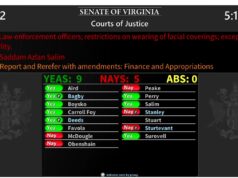Maybe it’s just me, but I find this entire narrative by State Sen. Barbara Favola (D-Arlington/Fairfax/Loudoun) about why we need redistricting reform to be, uh, “off.” The video’s below, followed by a few thoughts…
First off, I’m not sure about Sen. Favola’s argument that districts drawn by an independent commission would be “more moderate so our lawmakers would be better able and more willing to compromise.” I checked with the Brookings Institution, which asked, “What does research tell us about the relationship between gerrymandering and what Brookings Senior Fellow Thomas Mann has called “the hyper-partisanship that paralyzes our politics and governance?” The findings? (bolding added by me for emphasis)
- “Brookings scholars who study the matter agree that [gerrymandering] is not the primary cause of polarization, though this conclusion doesn’t mean that redistricting reform isn’t necessary.”
- “…the more salient problem, experts observe, is that Americans are sorting themselves politically, regardless of how congressional district boundaries are drawn.”
- Having said that, Brookings also writes that, “Considered in tandem with low-turnout primaries, gerrymandering further diminishes the influence of moderates” and that the “three reasons why American politics are so polarized” include “the current system for primaries; redistricting; and the congressional leadership system.”
- However…”the clustering of Americans into like-minded communities, they argued, makes redistricting reform not the ultimate solution to the problem of polarization.”
So on that point, Sen. Favola appears to be partly correct, but also incorrect, in that a lot more of the polarization phenomenon appears to be explained by factors other than partisan gerrymandering.
Now here’s where I really have an issue with what Sen. Favola is saying, both in terms of substance and also in terms of “framing.”
“If you have districts that are very lopsided, with one party or the other – either all Democratic are all Republican – lawmakers tend to worry about primaries more than the general election. And if you’re worried about primaries, you’re going to navigate to the extreme portions of your political spectrum which it’s not good, it’s just not where most Virginians are.”
This is just wrong…on many levels. For starters, the research clearly shows that polarization in this country over the past few decades has been strongly “asymmetrical,” as “the Republican Party has moved toward the extreme much more quickly.”
Also see this WGBH story, which reports that “political polarization is more common among conservatives than liberals — and that the exaggerations and falsehoods emanating from right-wing media outlets such as Breitbart News have infected mainstream discourse.”
Finally, check out this NPR story on the book “How Democracies Die,” which I just finished reading (and which I strongly recommend everyone read!). One of the bottom-line conclusions of the authors is that it’s overwhelmingly one party – the Republican Party – that has gone to the “extremes.” Here’s one of the authors, Steven Levitsky:
- “We think that the most egregious sort of pushing of the envelope began with Republicans, particularly in the 1990s and that the most egregious acts of hardball have taken place at the hands of Republicans.”
- “Yes, we believe the Republicans have become a more extremist party. For us, the most persuasive explanation has to do with the way our parties have been polarized along racial and cultural lines. And the way that our parties have lined up, with the Democrats being a party, essentially, of secular, educated whites and a diversity of ethnic minorities and the Republicans being a fairly homogeneous white, Protestant party, or white Christian party, the Republicans have basically come to represent a former ethnic majority in decline. You have many – certainly not all – but many Republican voters who feel like the country that they grew up with, or grew up in, is being taken away from them. And that can lead to pretty extremist views and voting patterns.”
As for Democrats and progressives, if you look at the polling, it turns out that on issue after issue, we are in the majority or plurality, while Republicans are in the minority. For instance:
- On climate change, 43% of Republicans in 2017 said it’s a “hoax,” a belief which is wildly false, anti-science and just plain bonkers, while only 5% of Democrats said the same.
- On abortion, only around one quarter of the U.S. public – heavily weighted towards Republicans – believes that abortion should never be permitted, while around three quarters believe it SHOULD be permitted – either “generally available” (45%) or “available under stricter limits” (32%). On Roe v Wade, 54% of the American public wants it upheld, something Democrats strongly agree with, while Republicans by a 45%-39% plurality want it overturned.
- On guns, 56% of the American public supports stricter gun laws – majorities of both Dems and Independents, but only 24% of Republicans.
- On immigration, the majority of Americans oppose building a wall along the southern border, with both Dems and Independents against it and…yep, Republicans overwhelmingly FOR it.
- On the Affordable Care Act, the overwhelming majority of Americans believe it should be kept in place, with “some changes as needed.” As for Republicans, a whopping 45% want the ACA repealed and replaced entirely, compared to just 6% of Dems and 24% of Independents who want that.
- On LGBT equality, a whopping 73% of Americans believe that transgender people SHOULD be allowed to serve in the U.S. military. That includes 90% of Dems and 75% of Independents. Among Republicans, in contrast, it’s almost evenly split, with a slight 48%-45% plurality supporting the right of transgender people to serve in the military. And on same-sex marriage, it’s similar – 58% of Americans think it should be legal, including 72% of Dems, 59% of Independents…but just 38% of Republicans.
We could go on all day with this, but you get the idea – the party that’s far more in the “center” of American public opinion, on issue after issue, is the Democratic Party, while the Republicans are off in their own (far-)right-wing, Rush/Fox-echo-chamber bubble…
So getting back to Sen. Favola’s argument that partisan gerrymandering leads BOTH Republicans AND Democrats to “the extreme portions of your political spectrum,” that simply does not appear to be the case. At all. That includes right here in Virginia, where I’d point out that folks like Sen. Favola herself were elected under district lines drawn mostly by Democrats back in 2011. So by Favola’s reasoning, we would expect today’s Virginia Senate Democratic caucus to be “extreme.” Yet it isn’t – by any stretch of the imagination. Instead, by almost any metric, the Virginia Senate Democratic caucus is very “moderate” and “mainstream,” while the Virginia Senate Republican caucus – elected under lines NOT drawn by Republicans – is in the minority on issue after issue (plus, check out some of their bats***-crazy members, like Dick Black and Amanda Chase, who have absolutely no equivalent or even close-equivalent on the Democratic side of the aisle).
[Note: On the House of Delegates side, where Republicans drew the lines back in 2011, the Democratic caucus is again very “centrist,” if you look at their stances on the issues relative to public opinion, while the House Republican caucus is faaaar out there, whether on a woman’s right to choose, gun violence prevention, climate action, the ERA, hate crimes, voting rights, or almost any other issue you can think of.]
Bottom line: Sen. Favola is correct that partisan gerrymandering is a problem, but she wildly overstates and misstates/distorts its impact, drawing a very unfortunate “false equivalency” between Democrats and Republicans, and implying that Virginia Democrats elected under current districts lines are “extreme” in some way. That’s simply NOT the case. It’s also very unhelpful “framing.”



![CNU Wason Center Poll of Virginia: Trump Approval at Just 34%; “narrow majority support a constitutional [redistricting] amendment”](https://bluevirginia.us/wp-content/uploads/2026/01/wason0128-1-238x178.jpg)







